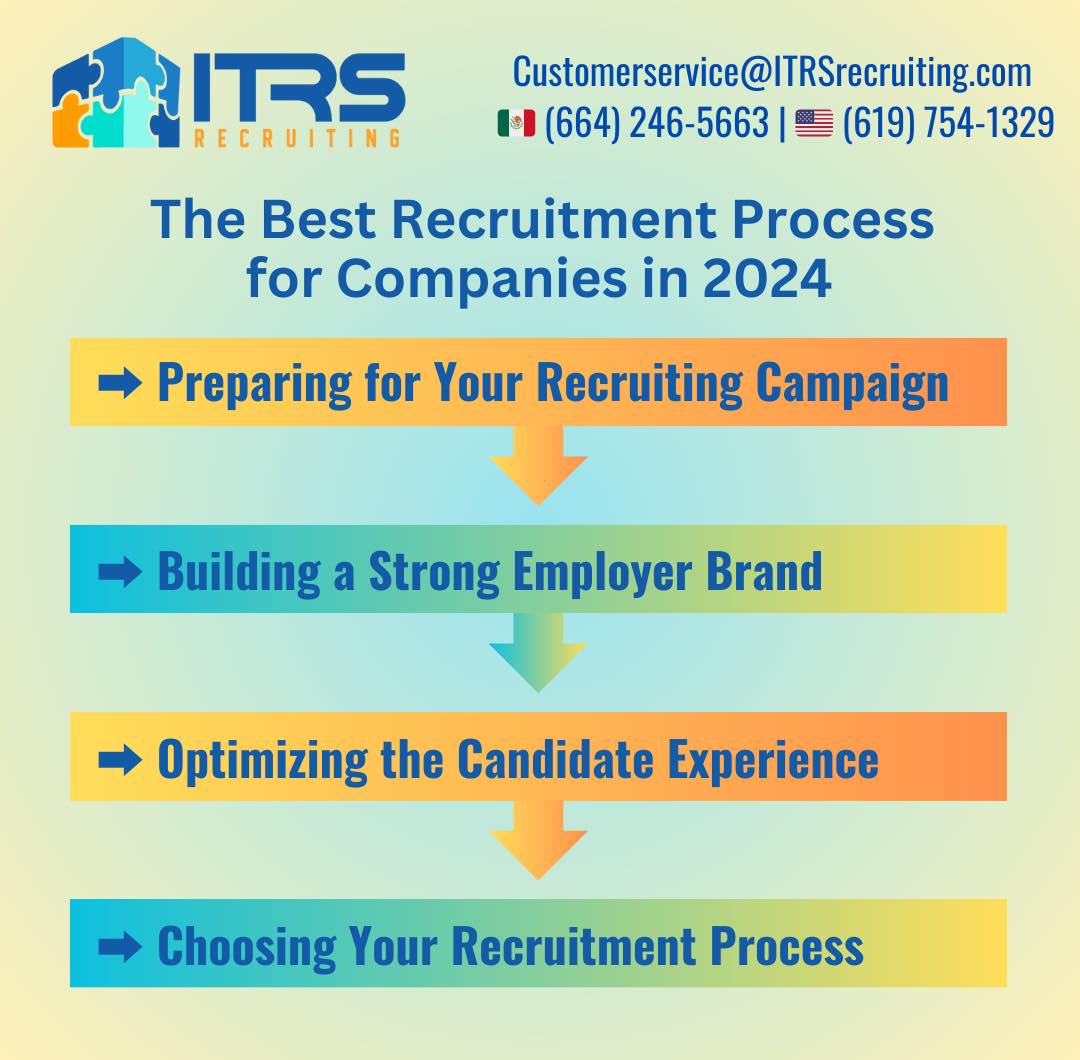The Best Recruitment Process for Companies in 2024

Recruiting is a complex process influenced by candidate preferences, technology advancements, and market dynamics.
Selecting the right recruitment process for your Organization can be challenging, especially with skill shortages, AI applications, and changing work styles like hybrid and remote work.
However, an effective recruitment strategy is essential for attracting and retaining talent and fostering a thriving workforce.
How do you define the right process? We’ll guide you through the pros and cons of various recruiting strategies and outline the steps to enhance your hiring success.
**Preparing for Your Recruiting Campaign**
Despite increased access to talent, especially for companies offering remote work, the market remains skill-short. Over the past six years, more than half of all organizations have faced severe skill shortages, according to Statista.
Countries like the UK, the US, and Australia consistently struggle to fill skilled roles. To improve your chances of attracting talent, you need an excellent employer brand and a fantastic candidate experience.
Let’s start with your employer brand.
**Building a Strong Employer Brand**
According to recent LinkedIn data, 88% of candidates consider a company’s employer brand when applying for a role. A strong employer brand communicates why candidates should work for your company, highlighting unique benefits and company culture.
A robust employer brand attracts high-performing talent by showcasing positive aspects of your company. Exceptional benefits, diversity, equity, and inclusion efforts, and investment in team development encourage employees to stay with your company.
To optimize your employer brand:
Identify Candidate Preferences: Understand what candidates in your industry want, such as flexible working options and unique benefits.
Create a Compelling Culture: Highlight your company culture, professional growth opportunities, and efforts to support diversity, equity, and inclusion.
Promote Your Brand: Make your employer value proposition clear. Feature employee success stories on your website, share insights on social media, and emphasize benefits in job descriptions.
**Optimizing the Candidate Experience**
Delivering an excellent candidate experience is crucial for any recruitment process. This not only increases the likelihood of job offer acceptance but also enhances your employer brand and appeal to future candidates. Focus on:
Simplifying the Application Process: Over 70% of candidates abandon applications taking longer than 15 minutes. Allow candidates to sync their LinkedIn profile or upload CVs easily.
Transparent Communication: Keep candidates informed about their application status. Notify them when their application is received and under review.
Requesting Feedback: Gather insights from both successful and unsuccessful candidates to identify areas for improvement.
With a strong employer brand and a solid candidate experience, it’s time to select your recruitment strategy. Companies have several options, each with its pros and cons:
Recruitment Companies: Outsource your hiring process to professionals.
DIY Recruitment: Handle recruitment internally, including advertising, CV screening, and interviews.
Internal Talent Team: Create an in-house talent acquisition team, possibly collaborating with external recruiters.
Let’s explore the pros and cons of each option.
**DIY Recruitment: Pros and Cons**
Smaller businesses often rely on DIY recruitment to cut costs, but this approach has its downsides.
*Pros:
Cost Savings: Avoid hiring additional staff or paying recruitment companies, making it budget-friendly.
In-House Control: Full control over the recruitment process, from sourcing talent to managing the candidate experience.
Direct Communication: Direct interaction with candidates for better insights into their skills and competencies.
*Cons:
Time-Consuming: Managing the entire process internally can be complex and time-intensive, diverting key team members from their main tasks.
Limited Reach: Internal teams may lack access to extensive talent networks and resources, limiting your talent pool.
Lacking Expertise: Team members may lack recruitment expertise, affecting job descriptions, interviews, and talent sourcing.
**Internal Talent Team: Pros and Cons**
Hiring an internal team of HR professionals provides control and specialist skills for your recruitment process.
*Pros:
Dedicated Expertise: Focused solely on recruitment, bringing specialist knowledge and experience.
Alignment: Deep understanding of your company culture and employee value proposition.
Consistent Access: Long-term access to recruitment professionals who can develop a consistent strategy.
*Cons:
Resource Intensive: Significant investment in hiring, training, and maintaining HR professionals.
Limited Perspectives: May have a narrow view of industry trends and potential biases.
Scalability: Difficult to adjust recruitment efforts during varying hiring needs.
**Recruitment Company: Pros and Cons**
Using a specialist recruitment company is highly effective for ensuring you get the talent and support you need. Up to 90% of companies use professional recruitment for good reasons.
*Pros:
Access to Expertise: Recruitment companies offer specialized knowledge, pre-built networks, and resources for interviewing and job descriptions.
Expanded Reach: Agencies have extensive candidate databases and industry connections, helping you reach active and passive candidates and boosting your employer brand.
Time Efficiency: Outsourcing frees up your internal resources, allowing you to focus on growth. Agencies handle the recruitment process, saving you time and money and filling talent gaps quickly.
Recruitment companies also help identify trends, improve employer branding, enhance candidate experience, and assist with job descriptions and interviews, building a future talent pipeline.
*Cons:
Cost: Hiring a recruitment company can be expensive.
Less Control: You have less direct control over the recruitment process.
**Conclusion**
A strong recruitment process is essential for developing a thriving workforce. While a robust employer brand and excellent candidate experience are crucial, partnering with a recruitment agency often provides the best results. Their expertise, support, and extensive reach offer a significant advantage in a skills-short market.
